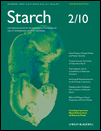Functional Properties and Retrogradation of Heat-Moisture Treated Wheat and Potato Starches in the Presence of Hydroxypropyl β-cyclodextrin
Abstract
Some functional and retrogradation properties of native and heat-moisture treated potato and wheat starches were examined in the presence of hydroxypropyl β-cyclodextrin (HPβ-CD). HPβ-CD increased swelling factor, amylose leaching, and solubility of both native and heat-moisture treated wheat starches but it had less impact on corresponding potato starches. Gelatinization enthalpy of native wheat starch was decreased in the presence of HPβ-CD but was increased in potato starch with increasing concentration. Reduction of amylose-lipid complex endotherm in both native and heat-moisture treated wheat starch was observed in the presence of HPβ-CD. Heat-moisture treatment did not change the transition parameters of amylose-lipid complex showing its resistance to hydrothermal treatment. HPβ-CD greatly decreased the pasting temperature of wheat starch. Cold paste viscosity of both native and heat-moisture treated wheat starch was increased by HPβ-CD to a greater extent than corresponding potato starch. Amylopectin retrogradation of all the starches was unaffected in the presence of HPβ-CD but heat-moisture treatment slightly decreased retrogradation of potato starch. These results suggest that HPβ-CD can disrupt the amylose-lipid complex within the starch granule in both native and heat-moisture treated wheat starch but has no influence on amylopectin retrogradation. However, greatly increased wheat starch setback with HPβ-CD indicates its greater effect on wheat starch amylose retrogradation.




